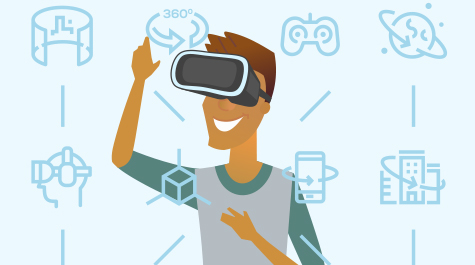In a tech-rich world, teachers matter more than ever
Parents and teachers who worry that online offerings such as Khan Academy and “smart” tech tools are going to make teachers obsolete the same way that Lyft and Uber want to make owning and driving a car obsolete can relax — teachers remain crucial.
In a study published in the July 2018 issue of the journal Contemporary Educational Psychology, Jason A. Chen, associate professor of educational psychology at the William & Mary School of Education, and colleagues at Harvard University and the University of Rhode Island reported that the degree to which teachers provide students with meaningful choices in the classroom in general can have an effect on the quality of students’ motivation and engagement for specific learning activities even if those activities are highly engaging technology-rich ones.
“This is powerful information for teachers because it suggests that tech-rich activities alone cannot cut it — teachers have to have the competence and confidence to provide meaningful choices for their students to think their way through learning activities,” said Chen. “Teachers matter. We looked at how students viewed the climate in the classroom, and found that when students felt like their teachers gave them meaningful choices in the classroom, students were more likely to have a positive and adaptive approach to math."
The research team wanted to find out how different types of technology interacted with students’ math learning and motivation. They compared data from a set of 7,774 students in Grades 5 to 8 whose classes were randomly assigned to one of three different technological approaches to learning. One group played a high-quality immersive educational video game. The second group watched a PBS movie with high production value about the practical application of mathematical patterns called fractals. The third group used the growth-mindset program “Brainology,” developed by Carol Dweck and colleagues. Chen recalled that earlier studies had failed to show a significant advantage of one type of technological tool over another.
“At some point, I thought to myself, maybe it’s not the technology the students are using, but their experience of that technology. It’s not a question of whether the movie, or the computer game, or the growth mindset tool worked best. Rather, it’s a question of how motivating and engaging the experience is, regardless of the technology activity students are using. The team asked the students a range of questions about their knowledge and beliefs related to math as well as their perceptions of their teacher and classroom climate.
Chen said he hopes this research will help to inform parents and school leadership as they decide on how to use school resources on learning technology.
“When there are problems in schools, a lot of people ask the question, what kind of technology do we need to solve this problem? Our findings suggest that is the wrong question to ask. You can use a movie just as well as you can use the latest computer games with great success. The question really should be, given the technology that we have and the problems that we are seeing, how do we leverage the technology in ways that most optimally connect with students’ experiences so they can get better at what we want them to get better at?”
Prior to completing his doctoral training, Chen was a high school chemistry and physics teacher. He said his approach to teaching science was low-tech, with the exception of carefully selected movies that illustrated specific points for his students.
This research follows a study published in the 2016 issue of Learning and Instruction in which Chen and colleagues examined students’ motivation to learn science using an immersive, multi-user computer program called “EcoMUVE”, which engages students in scientific inquiry regarding a pond ecosystem. The team was exploring the nature of the novelty effect regarding technology. They wondered whether students would tire of “EcoMUVE” over the 10-day tech-rich curriculum, and whether this novelty effect would have an impact on students’ motivation with the field of science. Not surprisingly, they found that all students showed some degree of novelty effect — all students were less interested (although still positively interested) in “EcoMUVE” at the end of the 10 days compared to at the start. But they also found that, compared to their peers who rapidly lost interest in “EcoMUVE”, students whose interests for “EcoMUVE” diminished slowly showed gains in interest and confidence in the field of science.
“This is a remarkable finding because so many activities — tech-rich or not — fail to translate interest in an activity into interest in science,” Chen said.
The researchers hypothesized that one reason why “EcoMUVE” was so successful in translating interest in “EcoMUVE” into interest in science is because “EcoMUVE” was designed specifically to make the act of scientifically inquiring through a difficult problem interesting. Also, teachers were an integral part of this curriculum because teachers helped students build their skills for inquiry so that students could become more proficient at solving progressively more difficult problems.
Take-aways for parents and teachers
Chen’s research offers a number of practical take-aways:
- Teachers need to develop the competence and confidence to manage the learning objectives and the technology well enough that they are able to provide students with meaningful choices in their learning.
- Regardless of the tech tool, teachers need to be thoughtful about how they use these tools to achieve their instructional goals. It’s not about getting the latest and greatest technology. Rather, it’s about supporting teachers in being thoughtful about what their instructional goals are, and how those instructional goals can be achieved with the right technology.
- Parents and teachers can encourage success in science by engaging students in appropriately challenging science inquiry tasks that are interesting to students, and that are close approximations of what real scientists do. When students find this authentic problem-solving to be interesting, they’re more likely to find the field of science interesting.
Chen is a fellow in the Center for Innovation in Learning Design at William & Mary, and also has been funded by the National Science Foundation as part of the Geoscience Opportunities for Leadership in Diversity (GOLD) program.

